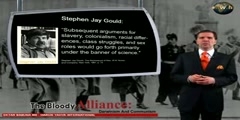Lec 24 - The Collapse of Communism and Global Challenges
European Civilization, 1648-1945 (HIST 202) The disintegration of the Soviet Union resulted from a number of different factors. Three important ones are nationalism among Soviet satellite states, democratic opposition movements, and economic crisis. Along with these elements, the role of Mikhail Gorbachev should not be discounted. Although his attempt to reform communism was rejected, his reformist positions as Soviet premier helped open the way for full-fledged political dissidence. One of the major challenges faced by Europe in the wake of the collapse of communism has been that posed by ethnic nationalism, a problem that erupted violently in the Balkans in the 1990s. Immigration and the defense of human rights are two problems that now confront the United States, as well as a United Europe. 00:00 - Chapter 1. The Fall of Communism: Nationalism, Democratic Reform, and Economic Change 16:47 - Chapter 2. The Dissolution of the Soviet System in the Satellite States of Eastern Europe 29:00 - Chapter 3. Globalization and Americanization in Europe 31:07 - Chapter 4. Immigration and the European Union 35:21 - Chapter 5. Human Rights in Europe and the United States Complete course materials are available at the Open Yale Courses website: http://open.yale.edu/courses This course was recorded in Fall 2008.
Video is embedded from external source so embedding is not available.
Video is embedded from external source so download is not available.
Channels:
Tags: communism Berlin Wall Soviet Union Russia globalization glasnost perestroika Reagan Ceausescu immigration emigration Hungary Czech Poland Solidarity Bulgaria Dubcek Krushchev liberalism free market Solzhenitsyn Walesa Hoxha Honecker Balkans nationalism ethnic America U.S.A human rights
Uploaded by: yalecivilizationeuro ( Send Message ) on 26-08-2012.
Duration: 41m 15s
Here is the next lecture for this course
Lec 6 - Lecture 7: Human Rights and Envir ...
01:54:17 | 3486 viewsLec 6 - Human Rights and Environment g ...
01:54:17 | 3408 viewsLec 2 -Hobbes: Authority, Human Rights an ...
42:56 | 3024 viewsLec 5 - Communism
15:03 | 2029 viewsLec 10 - Legal Studies 160 - Lecture 10: ...
01:08:10 | 2144 viewsLec 13 - Nationalism
50:50 | 2671 viewsLec 24 - Human Health and Global Change - ...
17:56 | 3807 viewsLec 6 - Human Health and Global Change - ...
17:56 | 3475 viewsLec 10 - Global Health Challenges in the ...
01:44:46 | 3194 viewsLec 54 - Global Coal Market
52:27 | 2732 viewsTHE BLOODY ALLIANCE: DARWINISM AND COMMUNISM
06:00 | 4793 viewsLec 21 - Stalinism
46:47 | 2427 viewsHuman ovulation captured on Camera
00:55 | 12629 viewsGlobal warming: contributiion of cosmic ray
07:15 | 4315 viewsLec 24 - Immigration
47:37 | 2251 viewsNo content is added to this lecture.
This video is a part of a lecture series from of Yale
Lecture list for this course
Lec 1- Introduction to European Civilization
Lec 2 - Absolutism and the State
Lec 3 - Dutch and British Exceptionalism
Lec 5 - The Enlightenment and the Public Sphere
Lec 6 - Maximilien Robespierre and the French Revolution
Lec 8 - Industrial Revolutions
Lec 11 - Why no Revolution in 1848 in Britain
Lec 12 - Why no Revolution in 1848 in Britain
Lec 15 - Imperialists and Boy Scouts
Lec 16 - The Coming of the Great War
Lec 18 - Sites of Memory, Sites of Mourning (Guest Lecture by Jay Winters)
Lec 19 - The Romanovs and the Russian Revolution
















